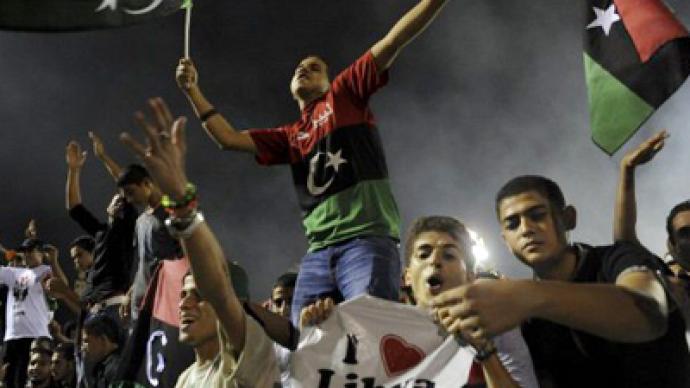Confrontation between Libyan rebels and pro-Gaddafi forces shows no sign of easing. Battles have been raging near the towns of Sirte and Bani Walid – two of the few remaining strongholds of the fallen regime.
Forces loyal to the colonel fired rockets from Bani Walid, where two of Gaddafi's sons are believed to be leading the armed resistance. That is despite the interim government apparently seeking to negotiate a peaceful resolution. The deadline for Gaddafi loyalists to surrender has been extended to this Saturday.As for the colonel himself, in his latest audio message the ousted leader claimed he was still in Libya and vowed he would never leave his ancestors' homeland.Interpol has issued an arrest warrant for Colonel Gaddafi, his son Saif al-Islam and military intelligence chief Abdullah al-Senussi on Friday, according to Reuters.Meanwhile the Libyan capital celebrates. For more than 10 days, Tripoli has been rejoicing in the dictator’s fall.“He wanted to hang his portrait here, in the central square, for his rule’s 42nd anniversary – but we put our flag up instead!” a local man told RT. “We won! We are so happy without him!”It seems in the last two weeks, rebel fighters have fired more bullets into the air to express their excitement than were shot during the assault on Tripoli earlier in August. But away from jubilant crowds we meet those who are not so pleased.Abdulrakham lives in Tripoli’s Abu Slim district, which has historically been pro-Gaddafi. When the rebels arrived, his sister was badly injured. She is still in hospital in Tunisia.Abdulrakham does not want to show his face on camera and insists on a hidden location for the interview. He says the revolution has brought much fear in its wake.“There is no peace. There is no safety in the city. We do not let our children outside when it’s dark. We are afraid. We always wait for something bad,” he tells RT. “When Gaddafi was here, at least we didn’t have to sleep awake, like we do now.”Abdulrakham says he also wanted change and a brighter future for his country, but not this way.“People are dying on both sides,” he continues. “The city’s been destroyed – and no one cares! Do they seriously think they changed it for the better? Don’t lie to yourself – just look around! Is this what you wanted?”And what is around is a scene of widespread destruction and social chaos. The badly damaged buildings matched by the rising stench of garbage and decomposing bodies. Armed youngsters roam the streets, barely old enough to understand that what they carry are weapons, not toys.Many shops, schools, and hospitals are closed, while the city’s cemeteries are growing bigger.Shortly after Tripoli fell into rebel hands, the National Transitional Council, Libya’s new authority, claimed it was moving here from Benghazi. But weeks have passed, and there is still no sign of its presence on the ground or of order being restored. The city is functioning by itself, and treading a fine line between freedom and anarchy.

